This Black History and Futures Month, we are spotlighting and celebrating our Black team and community members from across the organization as part of our We are Women’s series.

Name: Sandra Robinson
Pronouns: She/Her
Title & Department: Director, Perioperative Services
On the WCH team for: Eight Months
1. Why is Black History and Futures Month significant to you?
My greatest hope is that one day, we will not have to relegate Black History and Futures Month to only one month out of the year. This is history – period, and should be a part of our consciousness, our curriculum and our daily life. For now, it is an opportunity to pause and reflect, to highlight and celebrate the contributions that have paved the way so that all of us (not only the Black community) can reap the benefits.
2. How has your Black heritage influenced your work in healthcare?
Although I have been fortunate to have opportunities where I have been able to have influence on direction and priorities of policies and programs, I am conscious of the fact that this is a privilege that has not been afforded to many of my qualified Black colleagues. As a result, I not only ensure that I am inclusive, collaborative, and thoughtful about ideas and initiatives that are brought forward but also intentional in ensuring that equity, diversity and inclusivity are woven throughout the solutions that are proposed. I am passionate about and believe that I have an obligation to mentor and sponsor individuals who have valuable contributions to make but limited opportunities to shine.
3. What do you perceive as the main challenge(s) for the Black community in healthcare, both as patients and providers?
Executive leadership positions within the healthcare system are underrepresented by members of the Black community. The Black community wants and needs to see themselves represented at the decision-making tables to:
A) Help make important decisions about programming and spending and the overall health of the Black community.
B) Know that the opportunity to compete on a level playing field to attain these types of positions is possible.
In addition, patients want to see a reflection of themselves in the people in whom they are entrusting their lives. The lack of representation has led to mistrust of the healthcare system in which the Black community does not have a voice in creating a healthcare system that is representative of our needs. As a result, members of the Black community are waiting longer and experience more complications and worse outcomes because of these delays.
4. Who is your Black mentor or role model? Why?
My parents are my role models. They immigrated here from Jamaica and faced numerous obstacles, took risks and made sacrifices to make sure that we had the opportunities that they did not have. They showed resiliency, courage and pride. They were adept at not only embracing the Canadian culture, but also ensured that we did not forget the pride of being Jamaican. They showed us that hard work, perseverance and sometimes stubbornness, can help you achieve your dreams.